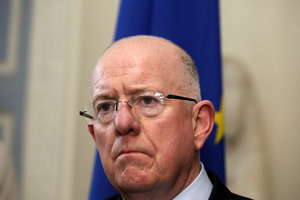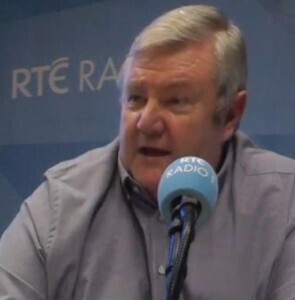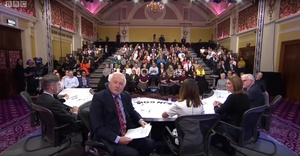From top: Minister for Justice Charlie Flanagan; Derek Mooney
I am not a big fan of the Minister for Justice, Charlie Flanagan TD Though he is a thoroughly decent and honorable guy and is doubtless motivated by a deep belief in public service, as a Minister he has shown a decidedly minimalist approach.
He was an underwhelming Minister for Foreign Affairs, who often looked and sounded completely at sea when dealing with Northern Ireland affairs.
By all accounts Flanagan was unhappy to leave that Department to make way for the lightning bolt that is Simon Coveney, and boy does it show in his current work as Minister for Justice.
The disregard I hold for Minister Flanagan, would appear to be mutual. He blocked me many years ago on Twitter. He was not a Minister then, just the Chairman of the Fine Gael parliamentary party.
The cause, if memory serves me correct, was my taking a swipe at him for tweeting “Bon Debarras (good riddance) Sarkozy” on the night the former French President lost the election.
I had the temerity to suggest, via Twitter, that this was hypocritical as, only a few months earlier he and Fine Gael, was very publicly embracing its EPP colleague. A point I remade in an Evening Herald column a week or so later.
My reason for mentioning this bad blood, is to put my next comments in context. Yesterday, for the first time in many years I felt moved to tweet kudos to Minister Flanagan.
This followed remarks he made in an interview with Sean O’Rourke on RTÉ Radio’ 1’s Today show.
Flanagan told O’Rourke that he was determined to ensure that the referendum debate would be devoid of Fake News. The Minister was absolutely to flag up this issue and to signal real concerns about the misuse of social media, by either side, in the campaign.
But, when you are the government minister who is responsible for Data Protection legislation you need to go beyond just voicing concerns about Fake News, you need to do something concrete about it – especially when the referendum campaign is effectively under way and voting is only about nine weeks away.
You should, along with your Cabinet colleagues, be doing something to tackle the issue – and yet the Government is not.
What makes this inactivity all the stranger, is that it cannot be motivated by a lack of inspiration as it has a possible remedy not just at its fingertips, but one that already has the backing of the Dáil.
The Online Advertising and Social Media (Transparency) Bill 2017 drafted by James Lawless T.D. could go a long way to tackling the problem. It also has the huge benefit of having already been approved by the Dáil at the end of its 2nd Stage debate by 58 votes to 56.
So why is the government not pursuing it? Why was the Tánaiste so eager to rubbish the Bill last week when the Green Party leader, Eamon Ryan asked when the government proposed to advance Deputy Lawless’s Bill.
Two interesting points arise here.
Firstly, why did Fine Gael and the government oppose Deputy Lawless’s Bill so vehemently last December?
Secondly why is Fine Gael, which does not have a Dáil majority, so determined to ignore the will of the Dáil on this and many other issues?
The answer to the first may be to do with simple hubris, the answer to the second may be a bit more sinister.
First the hubris. Part of Fine Gael’s antithesis to the Social Media Bill is that they see it, not so much as way of ensuring transparency in Social Media advertising and campaigning, (here is a link to a note explaining the Bill) but more as Fianna Fáil taking a swipe against the Taoiseach’s much loved Strategic Communications Unit.
To be fair, Fianna Fáil did use some of the Second Stage debate on the Bill to take a couple, or twenty, sceilps, at the SCU, but the Bill about a lot more than just that and Fine Gael should see beyond the political point scoring and recognise that the Bill tackles real issues and fills a glaring gap in our electoral law: the world of online campaigning.
Which leads me to the second issue.
Frankly, Fine Gael and the government needs to grasp that it failed to stop the Bill and that the Dáil decided that it wanted to pursue it.
This is how it is Dáil politics is going to work for the foreseeable future. No one group or one party gets to have it their own way all the time.
If the Government wants to get its agenda through, then it needs to seek consensus with others and it has an advantage in this, as it has range of options it can pursue. It can go to Fianna Fáil or, as it has on Shane Ross’s Judicial Appointments Bill, it can go to Sinn Féin.
But even though the government still has an upper hand in the building of consensus, this apparently is not enough. It wants it all ways.
Not only is the government ignoring the reality that Deputy Lawless’s Bill already has Dáil backing, it is ignoring last week’s vote of 85 to 49 in favour of disbanding the Strategic Communications Unit and:
“…the establishment of an independent panel, appointed by the Oireachtas, to examine the most effective way of operating Government communications to ensure value for money and freedom from political interference.”
This contempt for some decisions of the Dáil, namely those that have the backing of those other than Fine Gael is also partly responsible for the latest fiasco over Minister Ross’s ill-judged (you see what I did there?) Judicial Appointments legislation, aka the Dog’s Dinner Bill.
Over the past few days we have seen a series of walking and talking Fine Gael Press Office speaking notes saying how the Bill was now a dog’s dinner because the opposition was insisting on tabling amendments.
Eh, tabling amendments to legislation as it passes through the Oireachtas, particularly during its Committee and Report Stages, is precisely how the opposition parties attempt to change and amend legislation when it is before the Dáil and Seanad.
It is how our inelegant and often clumsy parliamentary system of legislative scrutiny works. As Leo McGarry remarks in the West Wing, borrowing heavily from a quote erroneously attributed in turn to Bismarck: There’s two things in the world you never want to let people see how you make ’em: laws and sausages.
If Fine Gael wants to change things back to the days when the government side controlled the agenda and had its way on all things, then all it has to do is call an election and go out and hold on to all the seats it currently has and win 30 extra ones. Simple, really.
Until then, play the hand the electorate dealt you and please stop trying to play your Jokers as Aces.
Derek Mooney is a communications and public affairs consultant. He previously served as a Ministerial Adviser to the Fianna Fáil-led government 2004 – 2010. His column appears here every Tuesday Follow Derek on Twitter: @dsmooney








pass me the puke bucket
yes, you in particular would have reason to worry.
oh I’m so worried…
“lightning bolt that is Simon Coveney”. I see Simon as more shuffling undertaker than bolting Bolt. Speaking of fake news….
Has the bill any knock on effects to free speech?
Your pet daschund is going to jail for giving the paw!
forgive me spelling :)
Hmm. Derek, your Minister of Justice and former provincial solicitor (Dermot Ahern) denied to the Irish people that the IMF were invited in by the incompetent government he was a member of and the same government you were an advisor to. The same government that schoolteacher, Michael Martin sat in cabinet at.
Lest we forget; the IMF has to be invited and it is an admission of a failed state.
So remind us; what was your stance back then?
pot kettle black… derek you and your type are part of the problem in this country not the solution.
FF TDS themselves made false claims to justify the anti-SCU part of the bill https://www.broadsheet.ie/2018/01/15/like-he-was-never-there/ ironic no?
So, ex Fianna Fáil official doesn’t think Fine Gael minister can do anything right.
Next week FG member writes that FF are awful.